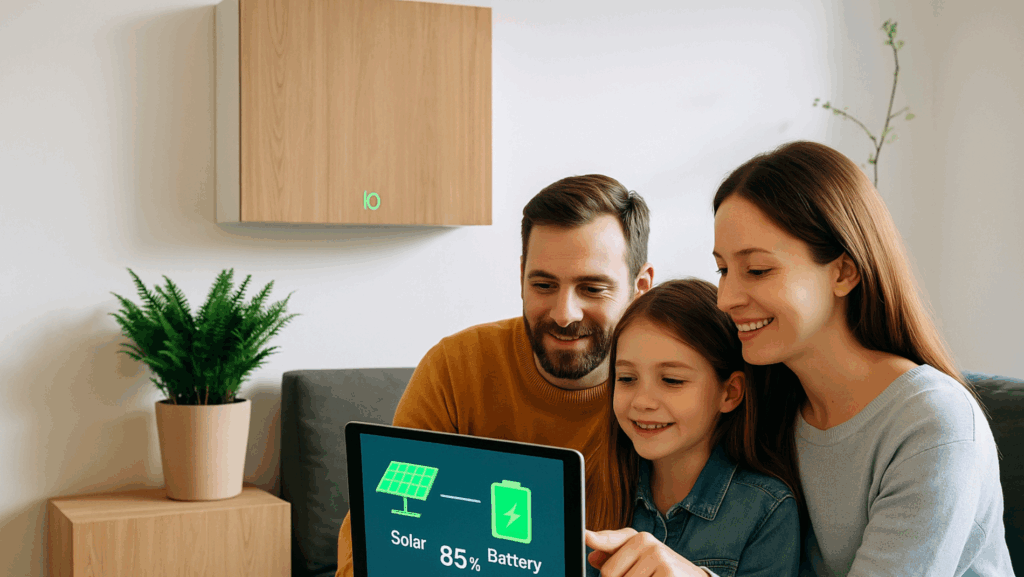How to Choose the Right Solar Self-Consumption Battery for Your System

If you are thinking about installing solar panels or already have them, you have probably asked yourself: What solar self-consumption battery do I need to store the energy I generate? Choosing this component well is key to making the most of your solar system, saving on your electricity bill and gaining energy autonomy.
But with so many options available, it is easy to get lost. That is why, in this article, we explain in a simple and practical way how to choose a solar battery and what aspects you should take into account to avoid making a mistake.
Power, Capacity and Inverter Compatibility: What You Need to Know
When looking for a solar self-consumption battery, it is important to pay attention to three key factors: power, capacity, and compatibility with your inverter.
1. Power: How Much Energy Can You Use at the Same Time?
Power indicates how much electricity the battery can deliver at a given moment. If you switch on several appliances at home at the same time (such as the oven, air conditioning, or an electric car charger), you will need a battery with enough power to avoid outages or limitations.
2. Capacity: How Much Energy Can You Store?
It is measured in kilowatt-hours (kWh) and tells you how much energy you can store in the battery. The higher it is, the more electricity you will have available when there is no sunlight. To determine what capacity you need, consider:
- How much energy you consume daily.
- Whether you use more electricity at night.
- How much independence from the electricity grid you want.
A good recommendation is not to go overboard or fall short. Oversized batteries are more expensive and may be underused, while smaller ones empty quickly and may wear out sooner.
3. Inverter Compatibility: Making Sure They Work Well Together
The inverter is the device that converts solar energy into usable electricity for your home. Not all batteries can be connected to just any inverter. That is why it is essential to choose a battery that is compatible with your inverter, so that the system works safely and efficiently.
Make sure that:
- The model is approved by the inverter manufacturer.
- It uses standard communication protocols (such as CAN or RS485).
- It offers direct or plug-and-play integration with your equipment.
Advantages of Choosing Modular and Scalable Batteries
Nowadays, many individuals and businesses opt for modular and scalable batteries, as they offer greater flexibility and adapt to each user’s real needs.
What Does It Mean for a Battery to Be Modular?
It means that it is made up of several independent modules. You can start with a small capacity and add more modules when you need more energy, without having to change the entire installation.
And Why Is It a Good Idea?
- Total flexibility: If you install more panels in the future, buy an electric car or your consumption increases, you can easily expand the battery.
- Easy maintenance: If one module fails, you do not need to replace the entire battery — just that block.
- Long-term savings: You do not have to make a large initial investment. You can expand gradually, according to your needs.
- Better use of space: They adapt to different types of homes or businesses, even when space is limited.
Ultimately, if you are considering a solar self-consumption battery, going modular is a safe bet for the present… and also for the future.
Tips for an Efficient and Safe Installation
A good choice does not end with buying the battery. It is just as important that the installation is carried out properly, following minimum standards of quality, safety and efficiency.
Here are some practical tips:
- Install in a suitable location: The battery should be placed in a protected, well-ventilated area, free from moisture or extreme temperatures. Avoid exposing it directly to sunlight or severe cold.
- Make sure it has a BMS: The Battery Management System (BMS) controls charging, protects against overcharging, and extends the lifespan of the equipment.
- Trust professionals: Look for certified and experienced installers. In addition to ensuring safety, they will help you comply with electrical regulations.
- Monitor your consumption: Some batteries allow you to see on your mobile how much energy you are generating, storing, and consuming. This helps you optimise your usage and detect potential issues.
Choosing the right battery for your solar self-consumption system does not have to be complicated. You just need to be clear about your consumption habits, have compatible equipment, and go for a solution that you can adapt over time.
A good solar self-consumption battery will give you energy freedom, reduce your electricity bill, and contribute to a more sustainable model. And if it is also modular, safe, and compatible with your inverter, you will be making a smart long-term investment.
Are you ready to take the next step towards energy self-sufficiency?